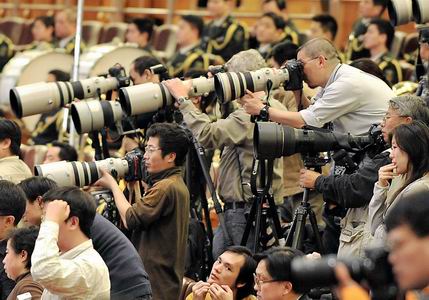
Photographers zoom in on the First Session of the 11th
National Committee of the Chinese People¡¯s Political Consultative Conference,
the top political advisory body, which opened in Beijing yesterday. The National
People¡¯s Congress, the top legislature, begins its annual meeting in Beijing
tomorrow.--Xinhua
Shanghai Daily news
China should revamp its tax regime for the stock market to foster long-term
investment and curb speculation, with the ultimate aim of protecting the
interests of minority investors, the country's top political advisory body has
been told.
The heated debate over proposed tax adjustments came at a time of mounting
stock-market volatility and calls from economists and observers for measures to
be taken to restore investor confidence.
China should overhaul its stock-market tax policies with a long-term
prospective, the Central Committee of the China National Democratic Construction
Association said in a proposal over the weekend to the ongoing Chinese People's
Political Consultative Conference. The proposal includes:
Reforming the levy of stamp duty on stock transactions to encourage long-term
investment;
Coordinating the country's personal and corporate tax systems with the
upcoming tax arrangement for the capital markets;
Imposing a capital-gains tax for stock transactions when the time is right,
with a low rate for long-term investors and higher rates for speculators;
Adopting international experience to avoid the repeated need to update
regulations.
The plan, marked as the No. 1 proposal for the meeting, suggested that
investors should be taxed based on how long they keep their equity holdings as
this would stabilize market performance.
Last May, the Chinese government tripled the stamp duty on stock transactions
to 0.3 percent, applicable to both buyers and sellers of shares. As the market
started to fluctuate late last year, investors turned anxious over what action
the government may or may not take.
"We don't have a complete tax system for the stock market and some current
rules don't help much to protect small investors," said Wu Zhiguo, a Guohai
Securities Co analyst. "It will be encouraging if the country can work out plans
to develop a mechanism for the long haul."
The surprise action to increase the stamp duty last year dented the key stock
index by as much as 20 percent at the time. Although equities recovered later,
investors still complained that they were faced with uncertainty over trading
costs.
Last year, stamp duty collected on equity transactions totaled 200.5 billion
yuan (US$28.20 billion), soaring more than 10 times over the amount of a year
earlier, according to official state tax data.
A large number of Chinese mainland citizens have expressed hopes that only
one side ?¡ì(r) rather than both ?¡ì(r) be required to pay the stamp duty and that
a 20-percent tax charged on the dividends paid by listed firms to investors
should be scrapped.
"I believe what's more important is to have an apparent system to decide when
to raise or slash trading costs," said Wu Ke, a Zhongtian Investment Consulting
Co manager, who conducts investments for retail clients.
The proposal also called for the drafting of detailed tax arrangements for
the fledgling bonds and futures markets and streamlining procedures to avoid
repeated duty levying.
"The aim of the reform should be focused on setting up a tax system with
fairness and targeting different sectors of the capital market," it said, noting
a capital gains tax should be only adopted when the timing is right.



